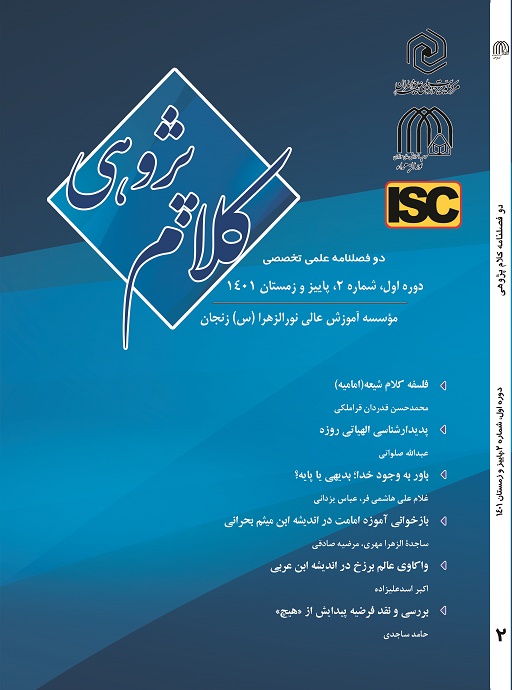نوع مقاله : مقاله پژوهشی
نویسندگان
1 دانشپژوه سطح چهار کلام اسلامی حوزه علمیه قم.
2 دانشجوی دکتری فلسفه اسلامی دانشگاه باقرالعلوم
3 فارغ التحصیل سطح 2 حوزه علمیه قم
چکیده
امامت از مهمترین مباحث در دایره تفکر اسلامی و در نزد امامیه اصلی از اصول دین است به نحوی که سعادت ابدی انسان به آن گره خورده است. مباحث امامت در سه حوزه «امامت لغوی»، «امامت تشریعی» و «امامت تکوینی» قابل طرح میباشد. در اعتقاد به اصل امامت، مصادیق، ویژگیها و شؤون آن میان امامیه اختلافی نیست؛ اما تعریفی که از امامت تشریعی مقبولیت یافته و عمده متکلمان متقدم و متأخر امامیه به آن پرداختهاند، با نواقصی همراه است که مهمترین آن عدم مانعیت غیرِ ائمه اثنیعشر و عدم جامعیت معتقَدات امامیه میباشد؛ چراکه سه عنصر اساسی امامت یعنی «عصمت»، «علم لدنی» و «نصب الهی» از آن به دست نمیآید و شؤون امام را صرفاً به ریاست و زعامت تقلیل میدهد. در این نوشتار، با روش «توصیفی- تحلیلی انتقادی» تعریف مشهور در قالب شش ملاحظه مورد ارزیابی قرار گرفته و در نهایت بر اساس اقتضائات عقل و شواهد نقلی، تعریف «هدایتگری حقیقی در مدار شریعت حقه الهی» با رعایت جامعیت، مانعیت و اختصار، جهت اصلاح و تکمیل تعریف مشهور، پیشنهاد شده است.
عنوان مقاله [English]
Analytical-Critical Reading of the Definition of Imamate from the Perspective of the Imamiyyah
نویسندگان [English]
- hasan akhond gorgi 1
- sajjad azarian 2
- Ali Azarian 3
1 Scholar of the fourth level of Islamic theology of Qom seminary
2 PhD student of Islamic philosophy at Bagheral Uloom University
3 Graduated Level 2 Islamic Studies
چکیده [English]
Imamate is one of the significant topics in the circle of Islamic thinking and according to the main Imamiyyah, it is one of the principles of religion in a way that the eternal happiness of man is tied to it. The topics of imamate can be discussed in three areas: "literal imamate", "legislative imamate" and "formative imamate". There is no difference between the Imamate in believing in the principle of Imamate, its examples, characteristics, and affairs; however, the definition of Islamic Imamate that has been acknowledged and addressed by most of the early and late Imamiyya theologians is accompanied by shortcomings, the most important of which is the lack of hindrance of non-Twelfth Imams and the lack of comprehensiveness of Imamiyya beliefs. As the three basic elements of Imamate, i.e. "infallibility", "knowledge" and "divine appointment" cannot be obtained from it, the Imam's affairs are reduced only to leadership. In this article, with the method of "descriptive-analytical criticism", the renowned definition has been evaluated in the form of six considerations, and finally, based on the requirements of reason and narrative evidence, the definition of "true guidance within the scope of the Divine Law" is defined with respect to comprehensiveness, hindrance, and brevity, to modify and complete the definition.
کلیدواژهها [English]
- imam
- religious imamate
- infallibility
- divine installation
- science of knowledge
- guidance

